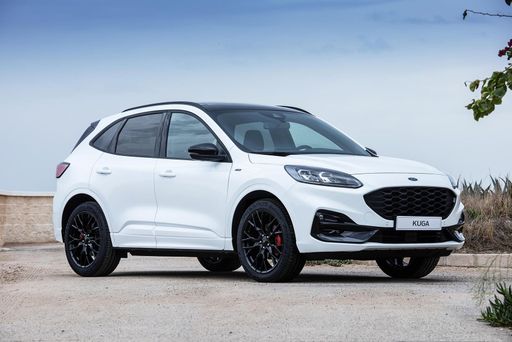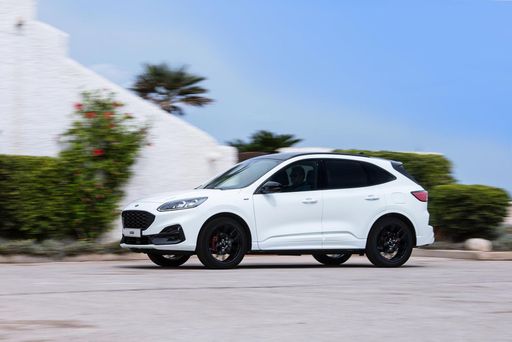Ford Kuga vs Hyundai Bayon – Which model is better for everyday use?
Everyday use, family trips or long-distance drives – here’s where the differences show.
Discover whether Ford Kuga or Hyundai Bayon fits your lifestyle better.
Costs and Efficiency:
Price and efficiency are often the first things buyers look at. Here it becomes clear which model has the long-term edge – whether at the pump, the plug, or in purchase price.
Hyundai Bayon has a clearly advantage in terms of price – it starts at 20100 £, while the Ford Kuga costs 34200 £. That’s a price difference of around 14185 £.
Fuel consumption also shows a difference: Ford Kuga manages with 2.80 L and is therefore decisively more efficient than the Hyundai Bayon with 5.40 L. The difference is about 2.60 L per 100 km.
Engine and Performance:
Under the bonnet, it becomes clear which model is tuned for sportiness and which one takes the lead when you hit the accelerator.
When it comes to engine power, the Ford Kuga has a significantly edge – offering 243 HP compared to 100 HP. That’s roughly 143 HP more horsepower.
In acceleration from 0 to 100 km/h, the Ford Kuga is significantly quicker – completing the sprint in 7.30 s, while the Hyundai Bayon takes 11.30 s. That’s about 4 s faster.
In terms of top speed, the Ford Kuga performs slightly better – reaching 200 km/h, while the Hyundai Bayon tops out at 179 km/h. The difference is around 21 km/h.
There’s also a difference in torque: Ford Kuga pulls somewhat stronger with 240 Nm compared to 200 Nm. That’s about 40 Nm difference.
Space and Everyday Use:
Cabin size, boot volume and payload all play a role in everyday practicality. Here, comfort and flexibility make the difference.
Both vehicles offer seating for 5 people.
In curb weight, Hyundai Bayon is clearly perceptible lighter – 1170 kg compared to 1526 kg. The difference is around 356 kg.
In terms of boot space, the Ford Kuga offers hardly perceptible more room – 412 L compared to 411 L. That’s a difference of about 1 L.
In maximum load capacity, the Ford Kuga performs clearly perceptible better – up to 1534 L, which is about 329 L more than the Hyundai Bayon.
When it comes to payload, Ford Kuga a bit takes the win – 550 kg compared to 465 kg. That’s a difference of about 85 kg.
Who wins the race?
The Ford Kuga proves to be wins the duel decisively and therefore becomes our DriveDuel Champion!
Ford Kuga is the better all-rounder in this comparison.
 @ Ford Motor Company / Ford Media Center
@ Ford Motor Company / Ford Media Center
Ford Kuga
Ford Kuga
The Kuga is Ford’s adaptable family SUV that blends usable space with a surprisingly lively driving character, making daily commutes and weekend escapes equally enjoyable. With smart interior packaging, an easy-to-use infotainment setup and composed road manners, it’s a sensible choice for buyers who want a bit of fun without the fuss.
details @ Ford Motor Company / Ford Media Center
@ Ford Motor Company / Ford Media Center
 @ Ford Motor Company / Ford Media Center
@ Ford Motor Company / Ford Media Center
 @ Ford Motor Company / Ford Media Center
@ Ford Motor Company / Ford Media Center
Hyundai Bayon
The Hyundai Bayon slips neatly between city runabout and small SUV, offering surprising practicality and a fresh, confident design that stands out in urban traffic. It's an easy buy for shoppers who want smart packaging, tidy handling and a dash of personality without fuss — a sensible little crossover that makes everyday driving a bit more enjoyable.
details @ Hyundai Motor Company
@ Hyundai Motor Company
 @ Hyundai Motor Company
@ Hyundai Motor Company
 @ Hyundai Motor Company
@ Hyundai Motor Company
 @ Hyundai Motor Company
@ Hyundai Motor Company
 @ Hyundai Motor Company
@ Hyundai Motor Company
 @ Ford Motor Company / Ford Media Center
@ Ford Motor Company / Ford Media Center
|
 @ Hyundai Motor Company
@ Hyundai Motor Company
|
|
|
|
Costs and Consumption |
|
|---|---|
|
Price
34200 - 46300 £
|
Price
20100 - 25800 £
|
|
Consumption L/100km
2.8 - 6.8 L
|
Consumption L/100km
5.4 - 5.5 L
|
|
Consumption kWh/100km
-
|
Consumption kWh/100km
-
|
|
Electric Range
68 km
|
Electric Range
-
|
|
Battery Capacity
1.1 - 14.4 kWh
|
Battery Capacity
-
|
|
co2
55 - 154 g/km
|
co2
124 g/km
|
|
Fuel tank capacity
42 - 54 L
|
Fuel tank capacity
40 L
|
Dimensions and Body |
|
|---|---|
|
Body Type
SUV
|
Body Type
SUV
|
|
Seats
5
|
Seats
5
|
|
Doors
5
|
Doors
5
|
|
Curb weight
1526 - 1859 kg
|
Curb weight
1170 - 1195 kg
|
|
Trunk capacity
412 L
|
Trunk capacity
411 L
|
|
Length
4604 - 4645 mm
|
Length
4180 mm
|
|
Width
1882 mm
|
Width
1775 mm
|
|
Height
1673 - 1681 mm
|
Height
1500 mm
|
|
Max trunk capacity
1534 L
|
Max trunk capacity
1205 L
|
|
Payload
541 - 550 kg
|
Payload
460 - 465 kg
|
Engine and Performance |
|
|---|---|
|
Engine Type
Petrol, Full Hybrid, Plugin Hybrid
|
Engine Type
Petrol
|
|
Transmission
Manuel, Automatic
|
Transmission
Manuel, Automatic
|
|
Transmission Detail
Manual Gearbox, CVT, Automatic Gearbox
|
Transmission Detail
Manual Gearbox, Dual-Clutch Automatic
|
|
Drive Type
Front-Wheel Drive, All-Wheel Drive
|
Drive Type
Front-Wheel Drive
|
|
Power HP
150 - 243 HP
|
Power HP
100 HP
|
|
Acceleration 0-100km/h
7.3 - 9.9 s
|
Acceleration 0-100km/h
11.3 - 12.4 s
|
|
Max Speed
195 - 200 km/h
|
Max Speed
176 - 179 km/h
|
|
Torque
240 Nm
|
Torque
172 - 200 Nm
|
|
Number of Cylinders
3 - 4
|
Number of Cylinders
3
|
|
Power kW
111 - 178 kW
|
Power kW
74 kW
|
|
Engine capacity
1496 - 2488 cm3
|
Engine capacity
998 cm3
|
General |
|
|---|---|
|
Model Year
2025
|
Model Year
2024
|
|
CO2 Efficiency Class
E, D, B
|
CO2 Efficiency Class
D
|
|
Brand
Ford
|
Brand
Hyundai
|
What drivetrain options does the Ford Kuga have?
The Ford Kuga is available as Front-Wheel Drive or All-Wheel Drive.
The prices and data displayed are estimates based on German list prices and may vary by country. This information is not legally binding.
